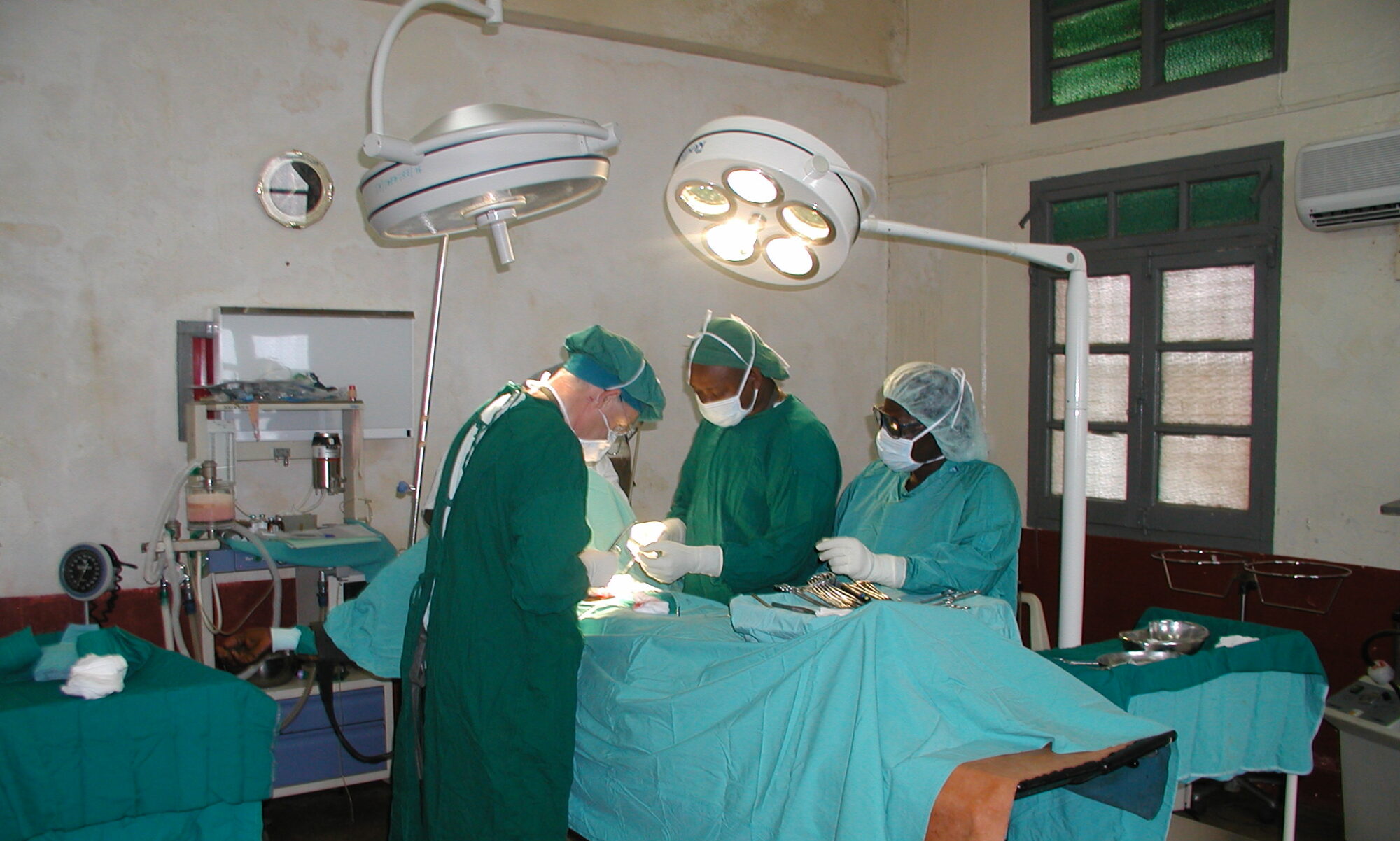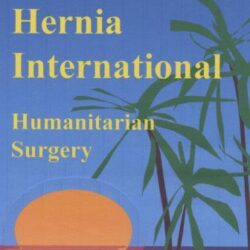Hernia International Report
Thirteenth Mission
Carpenter, Ghana, November 2016
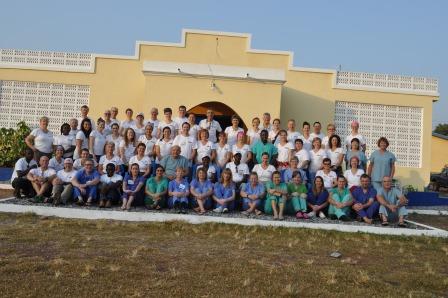
Hernia International team, Canadian GRID team and Ghanaian organisers
Leighton (North West) Team: Magdi Hanafy, Sara Watson, Perry Board, Geraldine Burke, Ramona Maria Fetita, Emma Brown, Ambareen Kausar, Diane Dugdale, , Katherine O’Shea.
Northampton Team: Rob Hicks, Nichola Blunt,
Canadian Team: Tony Brown, Martin Stewart, Laurie Patry, Margie McGregor, Susan Simpson
German Team: Antje Hopt.
Spanich Team: Natacha Apentchenko
Ghanaian Team: George, Colin, Noah, Mathew, Daniel, Mumuni, Eric, and many others.
Our surgical team this year comprised of 18 volunteers from the UK, Canada, Spain and Germany. Many of us had previous experience and some were newcomers. We travelled differently this year. After arriving in Accra with our 52 pieces of luggage, we were transferred to a hotel to rest overnight. The next day, rather than travelling to Carpenter by coach (an 11 hour trip) we took the plane to Kumasi, followed by a four hour drive to Carpenter. We arrived by lunch time and had time to unpack. This difference made our trip much easier. Although that incurred a cost it was well spent.
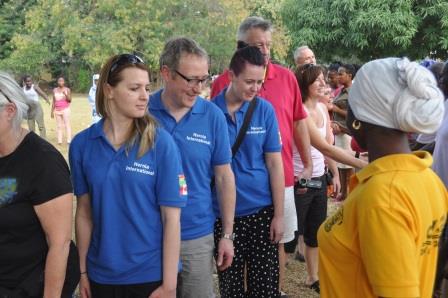
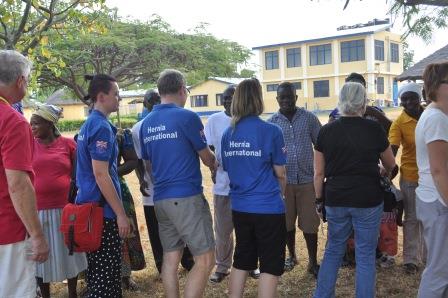
On the first day while we were arranging our theatres we received a patient with a strangulated hernia. He has been in this condition for four hours. The anaesthetists were not ready yet but managed to prepare themselves very quickly to put him to sleep. The operation went very well without the need for bowel resection. For the first time our first operation was an emergency.
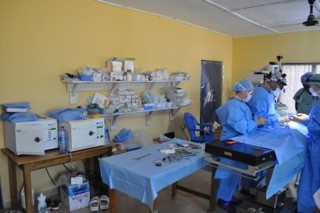
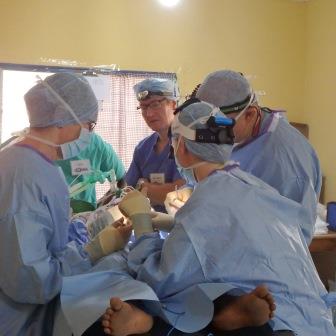
While we were operating, I was seeing patients in the clinic and listing them for the same and subsequent days to fill up three theatres with general and local anaesthetic cases. On that day, and subsequent days, I saw and listed sixty patients and refused to operate on lipomas, ganglia, skin lesions or anything else other than hernias.
One patient listed for an inguinal hernia operation in two days’ time was admitted on the second morning with the same hernia strangulated. He was operated upon successfully. In the evening after dinner another patient came with a small strangulated hernia. Two emergencies on the same day, three in 48hours, that was unbelievable. With the help of our anaesthetists’ sedation and pain control we managed to reduce the last hernia by gentle taxis. He was first on the next day’s list.
All children were screened for Malaria and 100% were positive. Each child required treatment for three days before the operation. The first children’s list was on Wednesday and the second was on Thursday of the second week.
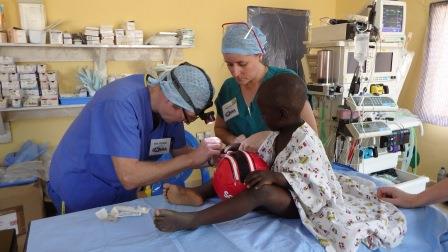
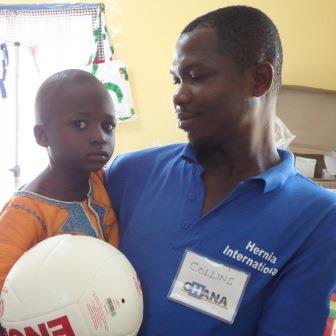
This unpredictability of emergency admissions made me conscious not to overload the lists and tire our staff. Average 9-10 procedures a day per theatre, taking into account the complexity of the cases, was more than enough. The aim was to finish all cases, clean theatres and finish computer work before sunset (6:00 pm) every day. I successfully resisted my desire to get every hernia on the planet operated upon, and was content with that number per list per day.
By the end of our mission (nine days), we counted 268 hernias operated on (219 patients). We worked hard as well in a daily clinic on site to populate the lists and in the villages to populate the waiting list for 2017.
We were five surgeons (all consultant level) and one registrar paediatric surgeon. Seven experienced theatre nurses, two consultant anaesthetists (one full time and one part time), one experienced anaesthetic assistant nurse, and one ITU nurse for recovery and ward duties. Not to forget our Ghanaian helpers who organised admission, discharges, patient transfers, translation, consenting, meals, rooms, calling us if we were needed for a condition or a question. We were also supported by Collins, a community Ghanaian nurse who tested all patients for HIV and Malaria before their operation. He is the nurse who will take charge and care of our patients after we leave and he will communicate with us if there are any problems.
This year did not hide any surgical challenges more than the usual hernia operations. We had two wound infections, one deep and one superficial. Both treated by incision, drainage, antibiotics, pain killers and daily dressings in our facility followed by the community care with Collins. I had one of the most dreaded complications while doing a Stoppa repair for bilateral large inguinoscrotal hernias. I unintentionally entered the dome of the urinary bladder. I catheterised the patient and repaired the bladder with two layers of interrupted Vicryl. I conferred with my surgeon colleague and we decided to continue with the repair of the hernias. A tense five postoperative days with IV antibiotics, Iron tablets, plenty of water to drink and urine observation for amount and colour. Seven days afterwards the urine was clear and the patient was eating and drinking and sitting out with the catheter and asking for a football. Nurse Collins will remove the catheter 10 days after the operation.
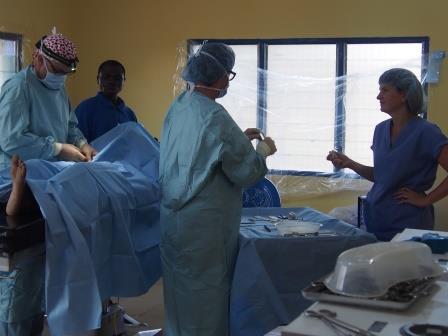
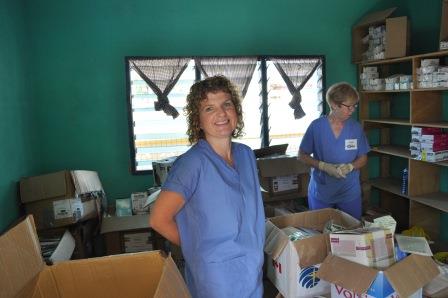
We operated on a Lumbar hernia the size of a small melon for the first time. We had a patient with a large Spigelian hernia on one side (shown above) and a large inguinoscrotal hernia on the other. We had a hernia going into the femoral sheath under the inguinal ligament. We had the appendix inside the hernia sac (shown below), we had an aneurysm of the common femoral vein (Left alone). We had an epigastric hernia that turned out to be a large mobile mesenteric cyst or a tumour when examined with the patient lying down. She did not have an operation and was transferred for a scan. We had a lady with a huge abdominal mass occupying all the abdomen for the last three years. The mass was tense, dull, not tender. The patient was transferred to another hospital for a scan. ? Ovarian pathology. I saw a large inguino-scrotal hernia, which when reduced showed worms in the scrotal skin that kept dancing on touch, each the width of a pencil and about 3-5 cm in length. Without a diagnosis we started the patient on intense anti-helminthic medications for five days. I am looking forward to seeing him next year. We saw a patient with a “moderate” inguino scrotal hernia, who could not pass urine unless he squeezed his scrotal hernia. We concluded that the urinary bladder was atonic and relying on this manoeuvre to contract. Repairing this hernia would put the patient at a disadvantage.
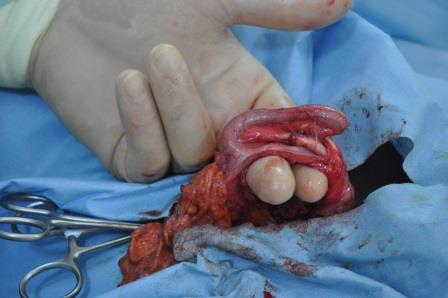
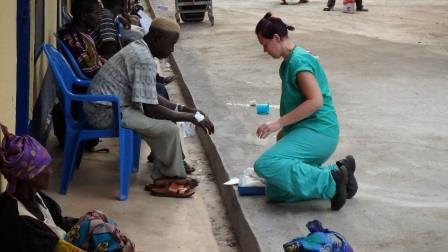
Our Canadian colleagues kept helping us by supplying IV antibiotics and fluids, as well as antimalarial medications and test kits for HIV and Malaria. We took turns in joining them in the villages and short listed many more hernias for next year. We also helped with opening abscesses, diagnosing surgical conditions and recommending treatments. Our autoclaves this year were extremely hard working as we sterilised instruments for the dental team as well. Our Ghanaians helpers did, as usual, the most to care for the patients and kept us informed and helped us deliver the service at a high level. Collins screened every patient. Noah consented them and answered any questions. George translated for me in the clinic and made sure the wrist band belonged to the patient concerned. Mumuni brought patients from outside the compound into the wards and allocated rooms for them, and discharged those who had operations the day before, booked minibuses for them and advised them regarding their take home medication. Mathew was a man who would not sleep, informed us of any problems, stayed up all night with the engineers to make sure the Air Conditioners were in place and working. He was the one who knew where we were and would come and let us know if a patient came with an emergency and stayed with us for translation. Everybody liked his dedication and personality.
Our Anaesthetists had Eric who is a qualified nurse anaesthetist from Bamboi. He took time off from his work to come and learn and help at the same time. He is a very good man who is willing to learn and help and never got tired. He is a good seed for the dream hospital we are going to build in the future. Nicky our ODP was described as having a battery attached to her as she never stopped working.
The way the team, from different countries and with different experience, gelled together and worked like a “well-oiled machine” was impressive.
Sister Watson described the work as “seamless care, which is how it felt really, I am always amazed at how everyone pulls together and helps each other in the unique experience that is Carpenter. Alongside the Ghanaian support team we laughed, worked tirelessly and became more culturally informed and enriched through shared conversations”.
The team worked hard and enjoyed what they were doing. The satisfaction in the face of each member of the team at the end of each day and on the last day of the trip was noticeable. Other than every day work, the packing and inventory on the last two days were made to perfection.
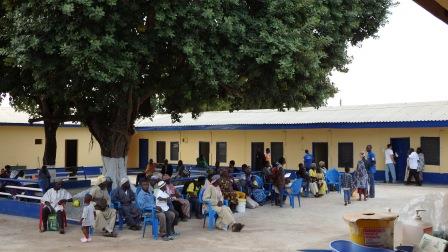
I would like to mention companies who worked hard to provide us with instruments and consumables needed for the trip. Medline supplied us with gowns, drapes, gloves and swabs enough to cover our mission. Eschmann supplied us with more sterilisers and diathermy machines to compensate for those which were destroyed last year by the electric power surge. KLM was kind enough to wave reasonable extra weights and accept extra luggage. ERS medical for transporting our luggage to the airports. Our Local pharmacy in Knutsford supplied skin sterilisers without charging VAT. Many employees in Leighton and South Cheshire hospitals have made me aware of useful redundant instruments that I could take for the mission before they are disposed of.
Rob Hicks will take over the organisation of the missions from 2017 onwards. The mission is lucky to have him as a leader. He has a much calmer approach than me and he is liked by all the team. I shall still be a member and travel as a surgeon and help as much as I can in organisational matters.
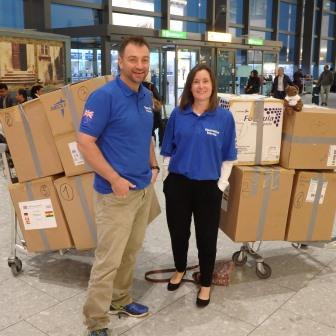
See you all in Carpenter 2017.
Magdi Hanafy
Consultant Surgeon
Mid Cheshire Hospitals NHS foundation Trust
Volunteer in Hernia International group.
On behalf of Team Carpenter 2016 (UK-Ghana-Canada -Germany- Spain)
GOD BLESS YOU
Please make donations to:
Operation Hernia Leighton Branch.
Addressed to Mr Magdi Hanafy, Surgical Department, Leighton Hospital, Crewe, Cheshire, CW1 4QJ.
PS: all patients (and families of) were consented before photos were taken and published.
See you all in Carpenter 2017.
Magdi Hanafy
Consultant Surgeon
Mid Cheshire Hospitals NHS foundation Trust
Volunteer in Hernia International group.
On behalf of Team Carpenter 2016 (UK-Ghana-Canada -Germany- Spain)
GOD BLESS YOU
Please make donations to:
Operation Hernia Leighton Branch.
Addressed to Mr Magdi Hanafy, Surgical Department, Leighton Hospital, Crewe, Cheshire, CW1 4QJ
.
Ps: all patients (and families of) were consented before photos were taken and published.
